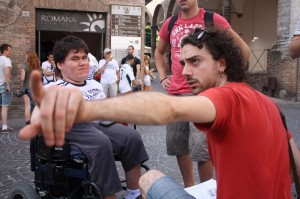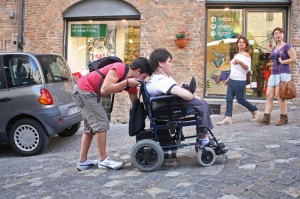Disabled students in Urbino depend on friends, because Italy’s laws are slow to bring accessibility and support.
URBINO, Italy – Francesco Berardi backs his friend Leonardo Stasi in his wheelchair down the steep via Mazzini as the wheels shimmy over the dark-cobblestones. The feat is difficult – moving about 50 yards backwards the whole way.
For people like Stasi, it is hard to get around ancient hill towns like Urbino, where public spaces are defined by architecture that is centuries old and respected more for its role in Italian culture than for its convenience.
Stasi, 21, was born with myelomeningocele, or spina bifida, a birth defect in which the backbone and spinal canal remain open before birth. He is currently in his second year of studying philosophy at the University of Urbino.
Living in the ground-level of La Vela, a modern dorm outside the city’s ancient walls, has given Stasi a positive and helpful environment. He said that everyone in the dorms is friendly and open.
Stasi is from the region of Calabria, the toe of the “boot” of Italy. He came the 418 miles to Urbino not knowing how the city was built with its steep streets and alleyways between old buildings that are usually not accessible to people in wheelchairs.
At first, the only person he knew in Urbino was his cousin, university student Leonardo Caliguiri, 22. Since then, Stasi has made many friends. Without the help of his friends, he said, he would be lost and would have to figure out how to get around on is own.
To the disabled, the laws of Italy often seem less friendly than its people. The Italian parliament passed Framework Law 104 in 1992 to help protect the disabled from discrimination and give them equal access, especially in public education. But critics say the law has been slow to bring full inclusion.
In particular, the laws have not solved the problem of making transportation and old buildings accessible in Italy.
Stasi says that bureaucracy is way too slow and that people only think about these sorts of problems when they are personally affected.
Eralda Lamce, 25, agrees. She was born with Friedrich’s ataxia, a rare inherited disease that causes damage in the nervous system and creates movement problems. The disease leads to impaired muscle coordination which can get worse over time.
Lamce, like Stasi, says that Italy’s laws for the disabled seem to be ineffective. Lamce is studying law because she hopes to change how things work. “Since I was a little girl I wanted to change the world,” Lance said. “But that seems to be impossible.”

Giuseppe Camerino, 22, discusses with Leonardo Stasi, 21, about a test they had just took in the Piazza.
Lamce was the president of an advocacy group called Pantarei for two years, but dropped out to focus on her studies.
Pantarei, which University of Urbino students and their tutors started in December 2005, supports disabled students and tries to find accommodations to help them get around Urbino. “Panta rei” is a Greek phrase from Heraclitus of Ephesus’s philosophy which means “everything flows.”
Lamce said that the University of Urbino, which funds Pantarei, offers services such as buses that are adapted to wheelchair access and may be contacted by the disabled for their individual needs. It can take time for students to learn the bus system, Lamce says.
She understands personally how hard it can be to travel through Urbino for those who have special needs, mainly because of the structure of the town.
The city is what it is, she says, with an architecture problem that people don’t want to change.
For the disabled, it comes back to getting help from friends. Stasi’s cousin and other friends help him get through day to day activities.
Caligiuiri, the cousin, said that they help Stasi in the morning with getting dressed and putting him up on his electric wheelchair. At night they repeat the same routine but backwards.
Stasi is like family to them. They all get together for lunch every day in Stasi’s room, where they make their own food and eat together. They watch movies, play videogames and recently have been watching the Euro Cup together.
“He’s a little brother to us,” Caligiuiri said. “We grew up together.”
Multimedia
